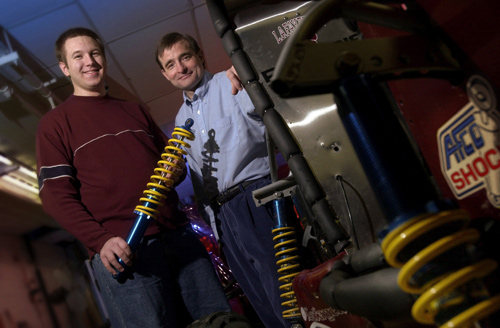The dream of joining a car-racing team is the motivation behind an honors thesis focused on improving the college’s Mini-Baja vehicle.
Mechanical engineering major Eric Todd Hauck ’02 doesn’t want to drive racecars as much as provide research and development aimed at improving the cars for a team one day.
For now, he is modeling the suspension system of the Mini-Baja vehicle used in endurance races. Hauck is working with Karl Seeler, associate professor of mechanical engineering.
“I have a pretty strong interest in cars and other machines,” says Hauck, a member of the Society of Automotive Engineers as well as the Mini-Baja Club. “But this project is also an exercise in data acquisition and systems dynamics, which are widely used in engineering.”
The student has wanted to participate in the senior design project of building the car since he was a sophomore. “This thesis allows me to do an honors project and work with the Mini-Baja car at the same time,” he says. “I’m excited about the project.”
Hauck will determine the mechanical properties of the car’s components, including the shocks, springs and tires, and then devise a computer model of the vehicle. He will confirm that the model is accurate, and then come up with suggestions for improving the car’s design.
“Few projects and laboratory exercises allow students to theoretically analyze a system, collect complete sets of data, and reanalyze the initial theory in order to validate the model,” says Hauck. “In order to produce a precise and accurate model of the physical system, both the entire system and its components must be analyzed. Data must be acquired from the physical system to confirm the model. The model is then modified until it resembles the response of the physical system. Once the model reflects the response of the physical system, it can be used to analyze the existing system and optimize it.”
Hauck says he is “very glad to be working with” Seeler, who is thoroughly knowledgeable in the area of systems dynamics as well as the overall mechanical engineering field.
“He has a great interest in the project and has already spent many hours with me discussing the details of it,” says Hauck. He calls Lafayette “a good academic environment for extensive, independent projects because students can get the individualized attention they need to make their project a success.”
In addition, the college’s machine shop and equipment are available to students, he says.
“Hopefully, Eric will be able to use both the course work at Lafayette to extend his understanding of dynamic systems into the graduate levels,” says Seeler. “And hopefully it will also lead to an improved design for the suspension of the Mini-Baja and he’ll get to see it race this summer.”
Hauck is a member of the American Society of Mechanical Engineers, the college choir, Lafayette Christian Fellowship, Dry Surfers, and Habitat for Humanity.

A National Leader in Undergraduate Research. Eric Hauck ’02 made a presentation on honors research he did under the guidance of Karl Seeler, associate professor of mechanical engineering, at the National Conference on Undergraduate Research.
